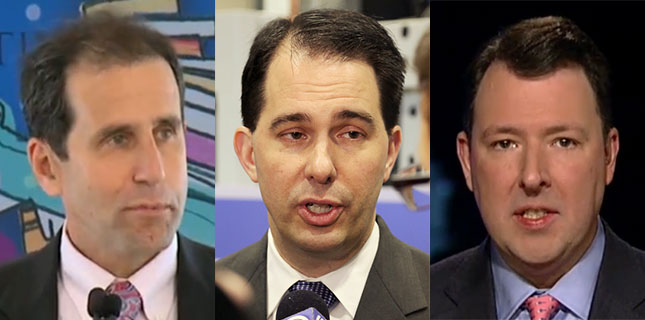 The Washington Post updated a piece from columnist Marc Thiessen to note his financial ties to Wisconsin Gov. Scott Walker and indicated the need for better disclosure in future Thiessen columns on the 2016 presidential campaign, in response to inquiries from Media Matters.
The Washington Post updated a piece from columnist Marc Thiessen to note his financial ties to Wisconsin Gov. Scott Walker and indicated the need for better disclosure in future Thiessen columns on the 2016 presidential campaign, in response to inquiries from Media Matters.
On September 1, the Post published a column from Thiessen criticizing the idea of former Massachusetts Gov. Mitt Romney running for president again in 2016. In the piece, Thiessen identified Scott Walker as one of several “successful governors” that would be a preferable candidate. Thiessen co-authored Walker's 2013 book, a fact the columnist has previously disclosed when writing about the governor for the Post but which went unmentioned in his latest column.
Media Matters published a piece criticizing the Post and reached out to the paper's editorial page editor, Fred Hiatt, who indicated that Thiessen's mention of Walker was “so glancing” that it did not warrant disclosure. But the Post subsequently reversed course, adding text to the column explaining, “Full disclosure: I co-authored a book with Walker."
Hiatt told Media Matters that he intends to meet with Thiessen to discuss the need for a “best approach” to disclosure in future columns touching on the 2016 presidential campaign.
“You are right that he has disclosed the relationship with Walker whenever he writes about Walker. In this case the reference to Walker was so glancing that I didn't think the co-authorship needed to be re-disclosed,” Hiatt said in an email. “But you ask a reasonable question, and as the campaign proceeds I will talk with Marc about what the best approach will be.”
The original lack of disclosure drew criticism from media ethicists who said leaving out the fact that Thiessen had co-authored a book with Walker is misleading to readers.
“I think this kind of entanglement is unacceptable,” said Edward Wasserman, dean of the Graduate School of Journalism at the University of California, Berkeley. “Where you don't know if a particular writer's column is a payback for favors done in the past or auditions for jobs sought in the future. The reader is not in a place to make any intelligent decisions based on the off-screen relationships. The fact that he is getting money off screen is just not compatible with that.”
As Wasserman suggested, Thiessen's extensive political career would make him a plausible hire in a Walker administration. The two have “developed a bond,” according to the Post's own reporting.
Kevin Smith, ethics committee chair of the Society of Professional Journalists, said such financial connections “widen an already large divide between the journalist and the public's right to be accurately and fairly informed.”
“News outlets like the Washington Post should know better. When you take a former White House operative and put him in the newsroom and call him a columnist do you think that he suddenly washes his hands of his political connections?” Smith said. “Do you think he runs out and takes a journalism ethics course at Georgetown? The Post bought a mouthpiece for the conservative right and then thinks he will conform to the highest journalism ethical standards. They know better.”
Tim McGuire, Arizona State University journalism professor and former editor of The Star-Tribune in Minneapolis, agreed.
“Writing a book with someone is a very intimate relationship and their financial connection is deep,” said McGuire. “The situation definitely requires transparency. But I also have to say I would think even Republicans will be dismissive of anything he writes about the Presidential race.”
Thiessen did not respond to requests for comment.
A former speechwriter for George W. Bush and Donald Rumsfeld, Thiessen is perhaps best known for a 2010 book defending the Bush administration's use of torture.